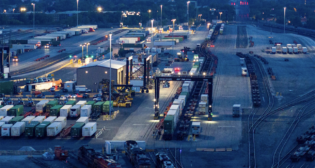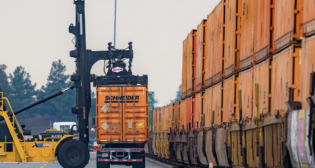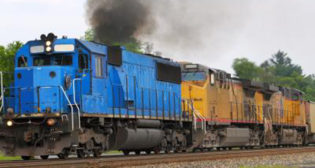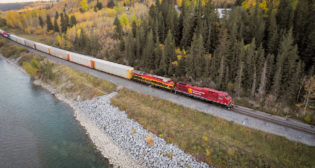
Railroads Accused of Runaway Greed by ‘Liberal’ Watchdog (UPDATED)
Written by William C. Vantuono, Editor-in-Chief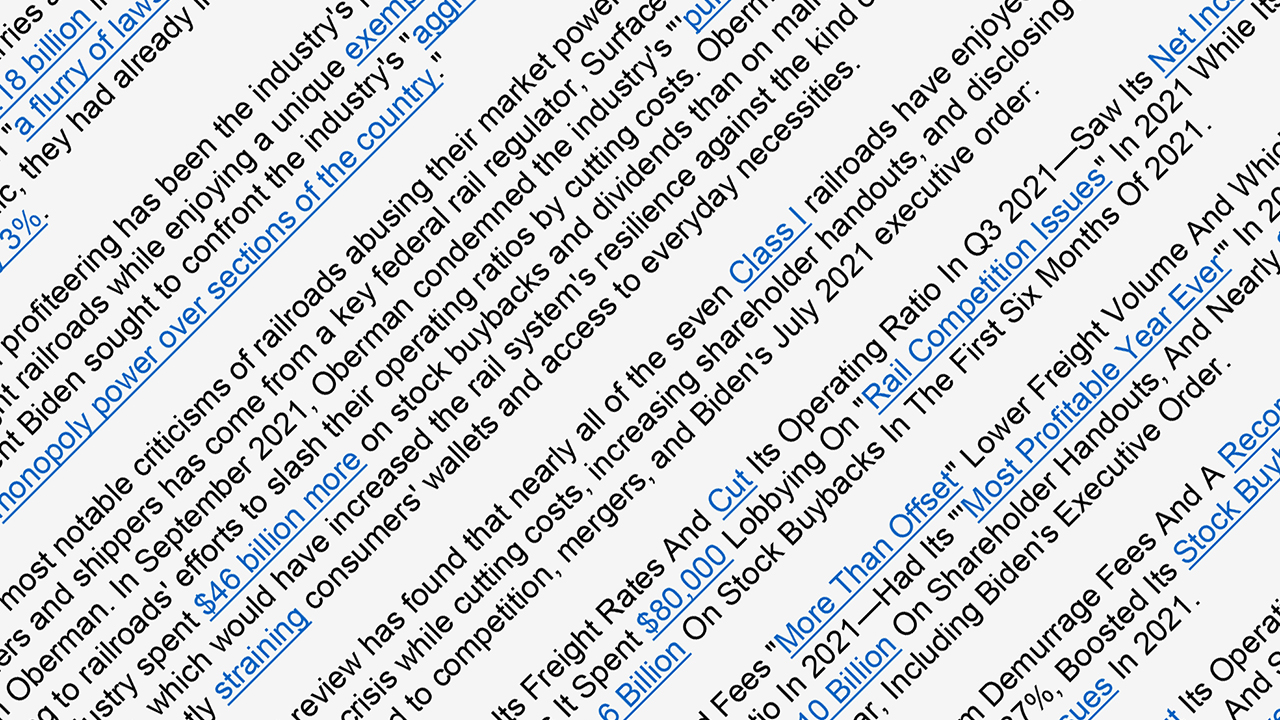
On the same day that the House Transportation and Infrastructure Committee Railroad Subcommittee is holding a hearing on Surface Transportation Board reauthorization, while rail labor is in the midst of contentious contract negotiations and the STB is conducting hearings on controversial subjects like reciprocal switching and Amtrak access, Accountable.US, described by several general media outlets including NBC News as a “liberal-leaning watchdog” group, has a released a blistering 40-page attack on Class I railroads accusing them of unchecked greed and profiteering from the COVID-19 pandemic. Some industry observers are inferring the report has “labor’s fingerprints all over it.”
“The rail industry, which carries about 40% of U.S. freight, is dominated by just seven major railways [that] collected a record $1.18 billion in fees for freight stuck in supply chain bottlenecks in the first nine months of 2021 and has seen ‘a flurry of lawsuits’ over these charges,” Accountable.us writes in the report’s (downloadable below) summary. “Yet before the rail industry’s fees set a record during the pandemic, they had already increased by [more than] 30% since 2000, all while railroads’ costs have only increased by 3%.”
The report claims a July 2021 Executive Order, Promoting Competition in the American Economy, issued by President Joe Biden, specifically targets railroads. As Railway Age reported on July 9, the EO “contains very little language directly pertaining to the USDOT, STB and the railroad industry, with the possible exception of how a Class I merger could affect Amtrak.” The Accountable.US report also points to STB Chairman Martin Oberman’s activist stance on railroad service:
“A key culprit for railroad profiteering has been the industry’s power to limit competition on the nation ’s privately owned freight railroads while enjoying a unique exemption from antitrust laws. A July 2021 executive order from President Biden sought to confront the industry’s ‘aggressive pricing’ and anticompetitive behavior, enabled by its ‘monopoly power over sections of the country.’
“One of the most notable criticisms of railroads abusing their market power at the expense of American consumers and shippers has come from a key federal rail regulator, Surface Transportation Board Chairman Martin Oberman. In September 2021, Oberman condemned the industry’s ‘pursuit of the almighty OR’— referring to railroads’ efforts to slash their operating ratios by cutting costs. Oberman estimated that since 2010, the industry spent $46 billion more on stock buybacks and dividends than on maintenance and equipment investments, which would have increased the rail system’s resilience against the kind of supply chain shocks that are currently straining consumers’ wallets and access to everyday necessities.
“An Accountable.US review has found that nearly all of the seven Class I railroads have enjoyed high profits amid the supply chain crisis while cutting costs, increasing shareholder handouts, and disclosing at least $9.37 million on lobbying related to competition, mergers, and Biden’s July 2021 executive order:
- “BNSF—Which Raised Its Freight Rates And Cut Its Operating Ratio In Q3 2021—Saw Its Net Income Jump By Double Digits As It Spent $80,000 Lobbying On ‘Rail Competition Issues’ In 2021 While Its Parent Company Spent $12.6 Billion On Stock Buybacks In The First Six Months Of 2021.
- “Union Pacific—Whose Increased Fees ‘More Than Offset’ Lower Freight Volume And Which Touted ‘Records’ For Cutting Operating Ratio In 2021—Had Its ‘Most Profitable Year Ever’ In 2021 Due In Part To Price Increases, Spent Over $10 Billion On Shareholder Handouts, And Nearly $3.8 Million Lobbying On Competition issues That Year, Including Biden’s Executive Order.
- “Canadian National—Which Touted Gains From Demurrage Fees And A Record Low For Its Operating Ratio In Q4 2021—Increased Its Net Income By 37%, Boosted Its Stock Buybacks By 317%, And Spent Over $1 Million While Lobbying On Merger Issues In 2021.
- “CSX—Which Credited Higher Fees For Its Profits And Cut Its Operating Ratio In 2021—Saw A 37% Jump In Net Earnings, Increased Stock Buybacks By 233%, And Spent Over $2.3 Million While Lobbying On ‘Rail Economic Regulation’ And Biden’s Executive Order.
- “Norfolk Southern—Which Increased Freight Rates While Touting An ‘All-Time Record’ Low For Its Operating Ratio In 2021—Saw Net Income Surge 27%, Increased Stock Buybacks By 143%, And Spent $1.8 Million While Lobbying On Antitrust Issues In 2021.
- “Canadian Pacific Railway—Which Has Been Subject To A Federal Inquiry Into Demurrage Fees And Is Trying To Acquire Another Class I Railway For $25 Billion—Saw Net Income Climb 17% To About $2.2 Billion While Spending $270,000 While Lobbying On Merger Issues In 2021.
- Kansas City Southern—Which Has Claimed That Demurrage Fees Are “‘Not A Revenue Source That We Seek To Increase'” While Subject To A Federal Inquiry About Fees—Saw Q4 2021 Net Income Jump 258%, Spent $188 Million On Shareholder Dividends In FY 2021, And Spent $120,000 While Lobbying On Mergers In 2021.
Capital Research Center, which describes itself as “America’s Investigative Think Tank,” in a January 2020 article titled Accountable.US’s Unaccountable “Dark Money” Roots, said Accountable.U.S., formed by three “progressive watchdog groups,” is connected to Arabella Advisors, which claims to be a philanthropic organization but is actually a “dark money network”:
“Against a backdrop of corruption allegations and partisanship, three ‘progressive’ watchdog groups have formed Accountable.US to push back against corruption in the U.S government. This new ‘nonpartisan’ nonprofit will focus on preserving accountability and transparency ‘in the Trump era and beyond,’ according to the Huffington Post. But Accountable.US’s formation by Allied Progress, Restore Public Trust, and Western Values Project demonstrates anything but accountability and transparency, much less nonpartisanship, given their connections to Arabella Advisors’ ‘dark money’ network.”
Industry Response
Railway Age asked the Association of American Railroads (AAR) to respond to the Accountable.us report. The association provided the following information “to consider as it relates to the report itself and the broader issues it addresses:
• “While railroads continue to confront challenges felt across the supply chain—namely a lack of available warehousing, a chassis shortage, and a labor crunch most pronounced in drayage trucking—the idea that railroads are using demurrage charges to “profit from the supply chain crisis” is false. On the contrary, these charges serve to incentivize other actors in the supply chain to act more efficiently and in ways that would improve the supply chain. For railroads to be able to efficiently move freight, we need to balance the inflow and outflow of goods in our yards. And customers picking up their products in a timely manner is required to preserve that balance.
• “Railroads only have so many tools to incentivize customers to quickly retrieve their containers. Many railroads are using some combination of approaches to accelerate customer pick-ups—such as rebates for quick or off-hour pick-ups and storage fees when containers exceed reasonable dwell time. To the extent any shipper has a concern, the STB acts as a backstop to adjudicate disputes.
• “This is why you saw the White House encouraging use of similar market mechanisms as it relates to clearing port cargo. As noted in a recent AJOT article, John Porcari, the administration’s former Port Envoy, noted: ‘We also worked with the ports to propose fees on ocean carriers that were leaving import containers at the ports in Los Angeles and Long Beach for too long. This (proposed) fee has helped lead to a 40 percent reduction in long-dwelling containers at those two ports.’
• “Rail played and continues to play a key role in getting goods to market domestically and as it relates to international trade. The proof is in the data:
—2021 was the second-best year for intermodal;
—2021 was the best year in history for chemicals;
—2021 grain carloads were the most since 2008.
• “While rail rates are modestly higher than they were a few years ago, average rail rates are equal to what they were in 1990—32 years ago. Rail costs have risen at a level approximately half of trucks. And rail-cost increases are modest compared industries such as chemicals and lumber. You can reference this analysis.
• “The assertion that consolidation has reduced competition is also false. No merger has allowed a shipper to go from two railroads one. Moreover, STB waybill data show that shipments to and from stations with single service have become less prevalent over time—meaning the proportion of stations served by multiple Class I railroads has increased since the mergers. Mergers created the efficient rail network we have today—extending the benefits of single-line service to more shippers and commodities while opening new markets and remaining a reliable transportation link throughout current supply chain challenges. (Can also be found in AAR’s STB comments)
• “Railroads will take necessary steps to protect the market-based regulatory structure that governs them. Passed by a Democrat-controlled Washington and signed into law by President Jimmy Carter, partial economic deregulation has been an undeniable success, spurring marked gains in safety, service, rates and productivity. However, it is misleading to argue that 2021 lobbying activities focused narrowly in this area. In fact, Congress passed a five-year surface transportation bill—the Infrastructure Investment and Jobs Act or BIF—which is the most significant piece of legislation for transportation and infrastructure stakeholders like railroads.”
